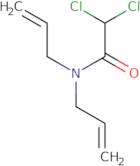Informations sur le produit
- 2,2-Dichloro-N,N-bis(prop-2-enyl)acetamide
- 2,2-Dichloro-N,N-di-2-propen-1-ylacetamide
- 2,2-dichloro-N,N-di(prop-2-en-1-yl)acetamide
- 2,2-dichloro-N,N-di-2-propenyl-acetamide
- Acetamide, 2,2-dichloro-N,N-di-2-propen-1-yl-
- Acetamide, 2,2-dichloro-N,N-di-2-propenyl-
- Acetamide, N,N-diallyl-2,2-dichloro-
- Dichloromid
- N,N-Diallyl-2,2-Dichloro-Acetamide
- N,N-Diallyl-2,2-dichloroacetamide
- Voir d'autres synonymes
- N,N-Diallyl-α,α-dichloroacetamide
- N,N-Diallyldichloroacetamide
- R 25788
- Stauffer R 25788
Dichlormid is an herbicide that has a wide range of environmental effects. It is a phenoxycarboxylic acid and an organic compound with the chemical formula CHOC(O)CHOH. The target enzymes of dichlormid are fatty acid synthase (FAS) and acetyl-CoA carboxylase, which are involved in the synthesis of lipids. These enzymes are inhibited by dichlormid, which leads to a decrease in the production of lipids. Dichlormid also inhibits protein synthesis, leading to cell death by inhibiting the production of proteins vital for cell division. Dichlormid binds to DNA polymerase and other macromolecules in cells, thereby causing cell death by inhibiting DNA replication and transcription. Dichlormid inhibits cycloheximide incorporation into bacterial cells, which blocks protein synthesis.
Dichlormid is also used as a plant growth regulator because it can inhibit





